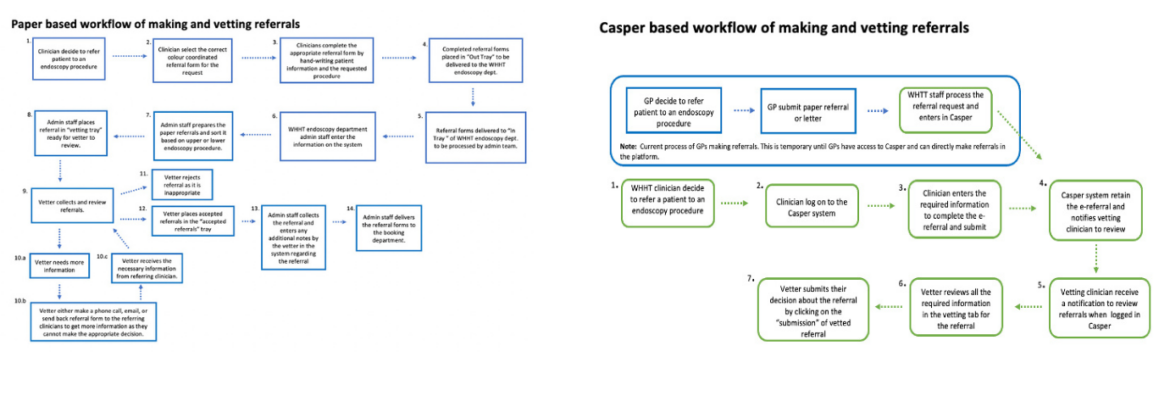Transforming gastrointestinal endoscopy referrals pathways with Cievert
Challenge
Gastrointestinal endoscopy referrals have steadily increased over the last decade. During the pandemic, a large proportion of endoscopies had to be postponed in order to protect patients and healthcare staff. This resulted in a significant backlog of patients waiting for endoscopies .
This means trusts have had to review and prioritise patients to minimise risk. Developing streamlined, robust vetting and tracking processes has become essential for managing demand, ensuring efficient referrals, and enabling endoscopy recovery.
Solution
Innovative software developers Cievert have over 10 years of experience in improving NHS clinical pathways using technology. Their Casper platform uses logic to manage referrals for endoscopic procedures, guiding the referrer through the process of submitting an endoscopy request, creating dashboards for the vetting and booking teams, and providing oversight of the whole process.
West Hertfordshire Hospitals NHS Trust (WHHT) endoscopy department wanted to improve their process of making, vetting, and booking referrals by moving from a paper-based approach to a digital one. As there was a not an “off the shelf” solution, the Trust with support from UCLPartners and AHSN NENC worked with Cievert in re-designing the Casper platform to digitise the process and solve the problem of meeting service demand and backlog issues.

Comparison of paper-based workflow verses the Casper based workflow: Download and view referral processes
Outcomes
The project was reviewed using a mix of qualitative quantitative (auditing Casper and paper-based referrals and a staff satisfaction survey) and qualitative (15 hours of clinical observations) methods. The aim was to understand staff members’ experience using the Casper platform and the short-term impact it had made on the process of making, vetting and booking referrals. The review found:
1. Reduced unnecessary referrals
- Casper supported the improved identification of inappropriate referrals by the point of triage, reducing clinically unnecessary procedures (Casper helped correctly identify 13% of the total referrals as inappropriate compared with 4% using the paper system. It is also likely that Casper prevented further inappropriate referrals being submitted in the first place due to improved system logic, embedded guideline reference tools and minimum data set requirements)
- Majority of Endoscopy staff surveyed believed Casper helped identify unnecessary referrals.
2. Improved referral accuracy
- Staff members surveyed believed that Casper’s features helped better prioritise referrals.
- A substantially higher proportion of Casper referrals had complete information about the patent compared to paper referrals.
3. Reduced administrative burden
- A range of surveyed staff members (doctors, nurses, and administrators) believed the software had improved the referral process in the gastrointestinal (GI) department.
- Staff members surveyed believe Casper have improved communication between referrals and referral vetters, and vetters and bookers.
- Staff members surveyed believe introducing Casper to the referral process helped reduce the number of steps taken to make referrals and vet them, thus reducing human error and delays.
Dr Jonathan Landy, Gastroenterology consultant at West Hertfordshire Hospitals NHS Trust said: “Casper has been fantastic. Easy to use and guides me through to make the right referral. Casper has enabled timely communications between referrers and vetters and between vetters and booking staff. Casper has been brilliant in enabling up to date reporting of demand allowing us to plan and manage our service more effectively”
Recommendations
Staff members involved in the project offered an important source of knowledge and expertise, given their practical understanding of the issues involved in implementing Casper.
- While many staff members in the GI department were comfortable using Casper, there are staff that may need additional training – Identify staff members across sites that are comfortable and knowledgeable about using Casper and willing to help provide training and support to other staff members.
- Regularly communicate the impact of Casper on improving the process of making, vetting and booking referrals to staff members. This will help staff members, particularly clinicians, understand the value of Casper, particularly in identifying unnecessary referrals and triaging referrals.
- Some clinicians believe the design of Casper can be further improved by considering factors in clinical settings that can make the platform difficult to use.
Ilias Zapantis, Deputy Head – Commercial and Innovation, UCLPartners said: “Gastrointestinal endoscopy was severely impacted by COVID-19 restrictions, which is why we were keen to work with Cievert as part of our work to aid the recovery of the NHS. This review shows not only that it has improved the process and helped staff in this setting but is an example to other trusts looking to adopt a pathway transformation solution at pace and speed to address real world challenges. Connecting innovators with trusts to test their solutions with a pragmatic approach is important to ensure new innovations improve services, and in turn, patient care.”
Chris Kennelly, Head of Secondary Care, Cievert, an Evergreen Life Company, said: “It has been fantastic collaborating with the team at West Herts Hospital Trust in the reimagining and further development of our Casper software for use in endoscopy. The result is a system that makes a real difference to the endoscopy referral pathway, helping to actively manage new referrals, backlog and minimise waiting times for patients.”
Next Steps
The partnership between Cievert and WHHT will continue to develop Casper and meet the GI department’s needs.
The team faced challenges in conducting the evaluation, due to the impact of the pandemic. They aim to develop a pragmatic study to generate more evidence required to inform next stages of spread and scale.
They will also conduct an additional evaluation of Casper that includes a cost evaluation analysis to better understand the financial impact of the platform on improving the process of making, vetting and booking referrals.
If you would like to learn more about the Casper software please contact Alex Blakoe.
Find out more about how UCLPartners support innovators and businesses with products and technologies on or close to market, or that may be ready to spread across the NHS.